2020八年级英语下册 Unit 1 Have you ever been to an amusement park?Section B学案(无答案) 鲁教版五
人教新目标英语八年级下册讲义—Unit 9 Have you ever been to a ……

新目标八年级下册Unit 9 Have you ever been to a museum ?讲义一、重点单词1. amusement n. 娱乐; 游戏2. somewhere adv. 在某处; 到某处3. camera n. 照相机; 摄影机; 摄像机4. invention n. 发明物5. invent v. 发明; 创造1. unbelievable adj. 难以置信的; 不真实的2. progress n. 进步; 进展3. rapid adj. 迅速的; 快速的4. unusual adj. 特别的; 不寻常的5. toilet n. 坐便器; 厕所6. encourage v. 鼓励7. social adj. 社会的8. peaceful adj. 和平的; 安宁的9. performance n. 表演; 演出10. perfect adj. 完美的; 完全的11. itself pron.(it的反身代词) 它自己12. collect v. 收集; 采集13. German adj. 德国的; 德语的; 德国人的n. 德语; 德国人14. theme n. 主题15. ride n. 供乘骑的游乐设施; 短途旅程16. province n. 省份17. simply adv. 仅仅; 只; 不过18. fear v. & n. 害怕; 惧怕19. whether conj. 不管......;还是); 或者......(或者); 是否20. Indian adj.印度的 n. 印度人21. Japanese adj.;日本的; 日本人的; 日语的n. 日本人; 日语22. equator n. 赤道23. whenever conj. 在任何......时候; 无论何时24. spring n. 春天25. mostly adv. 主要地; 通常26. location n. 地点; 位置二、短语归纳1.at night在夜晚2.in a more natural environment在一个更加自然的环境中3.all year round 全年4.be far from 离……远5.in the dark 在黑暗中6.in the past 在过去7.have been to sp. 去过某地8.science museum 科学博物馆9.history museum 历史博物馆10.amusement park 游乐园11.go somewhere different 去不同的地方12.go skating 去滑冰13.take the subway 坐地铁14.a great way to spend a Saturday afternoon一个过周六下午的好方法15.all the old movie cameras所有的古老的电影摄影机16.learn about sth.解有关……的情况17.on the weekend 在周末18.camp in the mountains 在大山里露营19.put up a tent搭帐篷20.in such a rapid way 以如此迅猛的方式21.different kinds of各种各样的22.development of toilets 厕所的发展23.social groups 社会团体24.the tea art performances茶艺表演25.make a perfect cup of tea with beautiful tea sets用漂亮的茶具沏一杯完美的茶26.a nice place to enjoy tea 一个品茶的好地方27.thousands of 数以千计的28.International Museum of Toilets国际厕所博物馆29.the Terracotta Army 兵马俑30.Southeast Asia东南亚31.Night Safari 夜间动物园32.three quarters 四分之三33.an English-speaking country一个讲英语的国家34.have problem doing sth. 做某事很困难35.during the daytime在白天36.a couple of times 好几次37.right now 现在;目前38.an amusement park with a special theme一个有特别的主题的游乐园39.walk around the park 在公园里到处走40.hear of 听说41.take a ride兜风42.another province另一个省43.the Bird’s Nest鸟巢44.encourage sb. to do sth.鼓励某人做某事45.on the one hand... on the other hand.一方面,另一方面三、句型集萃1.a great way to do sth一个做某事的好办法2.It’s unbelievable that很难相信……3.watch sb do sth.看某人做了某事4.encourage sb to do sth鼓励某人做某事5.as..as和。
2020年春人教版八年级英语下册单元考试测试卷:Unit9
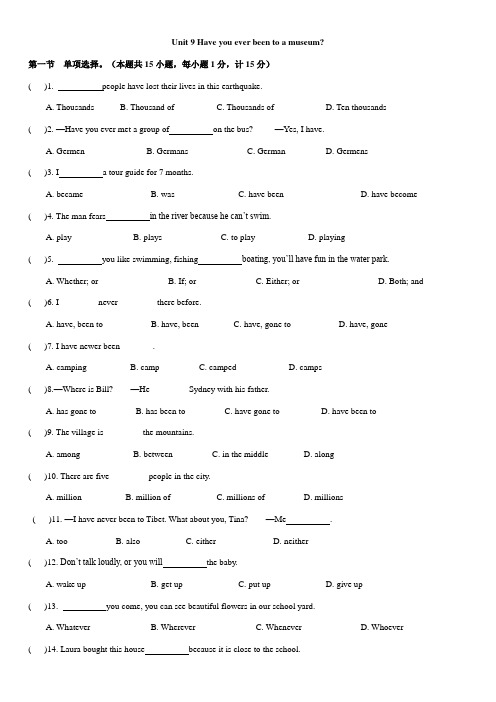
Unit 9 Have you ever been to a museum?第一节单项选择。
(本题共15小题,每小题1分,计15分)( )1. people have lost their lives in this earthquake.A. ThousandsB. Thousand ofC. Thousands ofD. Ten thousands( )2. —Have you ever met a group of on the bus? —Yes, I have.A. GermenB. GermansC. GermanD. Germens( )3. I a tour guide for 7 months.A. becameB. wasC. have beenD. have become ( )4. The man fears in the river because he can’t swim.A. playB. playsC. to playD. playing( )5. you like swimming, fishing boating, you’ll have fun in the water park.A. Whether; orB. If; orC. Either; orD. Both; and ( )6. I ________ never ________ there before.A. have, been toB. have, beenC. have, gone toD. have, gone( )7. I have newer been _______.A. campingB. campC. campedD. camps( )8.—Where is Bill? —He ________ Sydney with his father.A. has gone toB. has been toC. have gone toD. have been to( )9. The village is ________ the mountains.A. amongB. betweenC. in the middleD. along( )10. There are five ________ people in the city.A. millionB. million ofC. millions ofD. millions( )11. —I have never been to Tibet. What about you, Tina? —Me.A. tooB. alsoC. eitherD. neither( )12. Don’t talk loudly, or you will the baby.A. wake upB. get upC. put upD. give up( )13. you come, you can see beautiful flowers in our school yard.A. WhateverB. WhereverC. WheneverD. Whoever ( )14. Laura bought this house because it is close to the school.A. especiallyB. finallyC. simplyD. recently( )15. —Hello! Could I speak to Lily?—Sorry, she is not in. She Shanghai.A. have been toB. have gone toC. has been toD. has gone to第二节完形填空。
(完整版)外研版八年级下册英语课文及译文
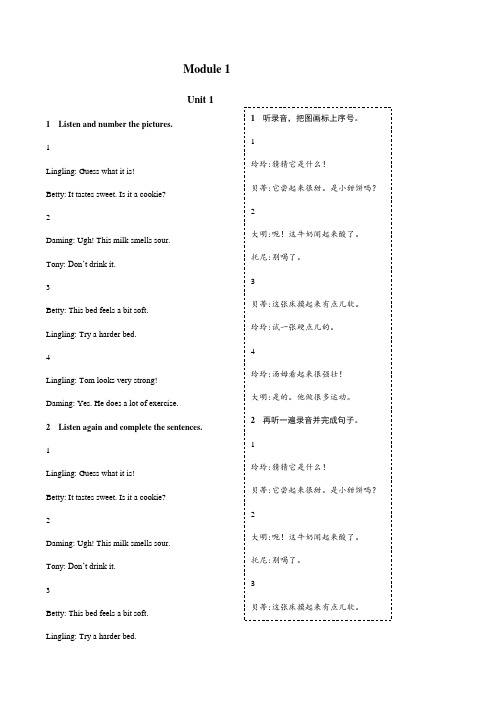
Module 1 Unit 11Listen and number the pictures.1Lingling: Guess what it is!Betty: It tastes sweet. Is it a cookie?2Daming: Ugh! This milk smells sour. Tony: Don’t drink it.3Betty: This bed feels a bit soft.Lingling: Try a harder bed.4Lingling: Tom looks very strong! Daming: Yes. He does a lot of exercise.2Listen again and complete the sentences. 1Lingling: Guess what it is!Betty: It tastes sweet. Is it a cookie?2Daming: Ugh! This milk smells sour. Tony: Don’t drink it.3Betty: This bed feels a bit soft.Lingling: Try a harder bed. 1听录音,把图画标上序号。
1玲玲:猜猜它是什么!贝蒂:它尝起来很甜。
是小甜饼吗?2大明:呃!这牛奶闻起来酸了。
托尼:别喝了。
3贝蒂:这张床摸起来有点儿软。
玲玲:试一张硬点儿的。
4玲玲:汤姆看起来很强壮!大明:是的。
他做很多运动。
2再听一遍录音并完成句子。
1玲玲:猜猜它是什么!贝蒂:它尝起来很甜。
是小甜饼吗?2大明:呃!这牛奶闻起来酸了。
托尼:别喝了。
3贝蒂:这张床摸起来有点儿软。
4Lingling: Tom looks very strong!Daming: Yes. He does a lot of exercise.3Listen and read.Tony: Mm...What a delicious smell! Your pizza looks so nice.Betty: Thanks! Would you like to try some?Tony: Yes, please. It looks lovely, it smells delicious, and mm, it tastes good.Daming: What’s that on top?Betty: Oh, that’s cheese. Do you want to try a piece? Daming: Ugh! No, thanks. I’m afraid I don’t like che- ese. It doesn’t smell fresh. It smells too str-ong and it tastes a bit sour.Betty: Well, my chocolate cookies are done now.Have a try!Daming: Thanks! They taste really sweet and theyfeel soft in the middle.Tony: Are you cooking lots of different things? You look very busy!Betty: Yes, I am! There’s some pizza and some cookies, and now I’m making an apple pie and a cake. Daming: Apple pie sounds nice. I have a sweet tooth, you know. Shall I get the sugar?Betty: Yes, please. Oh, are you sure that’s sugar? Taste it first. It might be salt!Daming: No, it’s OK. It tastes sweet. It’s sugar. Tony: What’s this? It tastes sweet too.了。
八年级英语下册:Unit 1 Have you ever been to an amusement
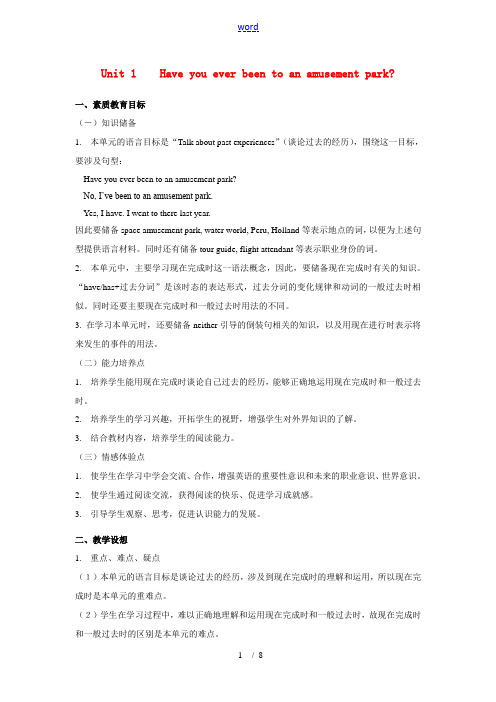
Unit 1 Have you ever been to an amusement park?一、素质教育目标(-)知识储备1.本单元的语言目标是“Talk about past experiences”(谈论过去的经历),围绕这一目标,要涉及句型:---Have you ever been to an amusement park?---No, I’ve been to an amusement park.---Yes, I have. I went to there last year.因此要储备space amusement park, water world, Peru, Holland等表示地点的词,以便为上述句型提供语言材料。
同时还有储备tour guide, flight attendant等表示职业身份的词。
2.本单元中,主要学习现在完成时这一语法概念,因此,要储备现在完成时有关的知识。
“have/has+过去分词”是该时态的表达形式,过去分词的变化规律和动词的一般过去时相似。
同时还要主要现在完成时和一般过去时用法的不同。
3. 在学习本单元时,还要储备neither引导的倒装句相关的知识,以及用现在进行时表示将来发生的事件的用法。
(二)能力培养点1.培养学生能用现在完成时谈论自己过去的经历,能够正确地运用现在完成时和一般过去时。
2.培养学生的学习兴趣,开拓学生的视野,增强学生对外界知识的了解。
3.结合教材内容,培养学生的阅读能力。
(三)情感体验点1.使学生在学习中学会交流、合作,增强英语的重要性意识和未来的职业意识、世界意识。
2.使学生通过阅读交流,获得阅读的快乐、促进学习成就感。
3.引导学生观察、思考,促进认识能力的发展。
二、教学设想1.重点、难点、疑点(1)本单元的语言目标是谈论过去的经历,涉及到现在完成时的理解和运用,所以现在完成时是本单元的重难点。
(2)学生在学习过程中,难以正确地理解和运用现在完成时和一般过去时,故现在完成时和一般过去时的区别是本单元的难点。
人教新目标版初中英语八年级下册Unit9Haveyoueverbeentoamuseum要点讲解
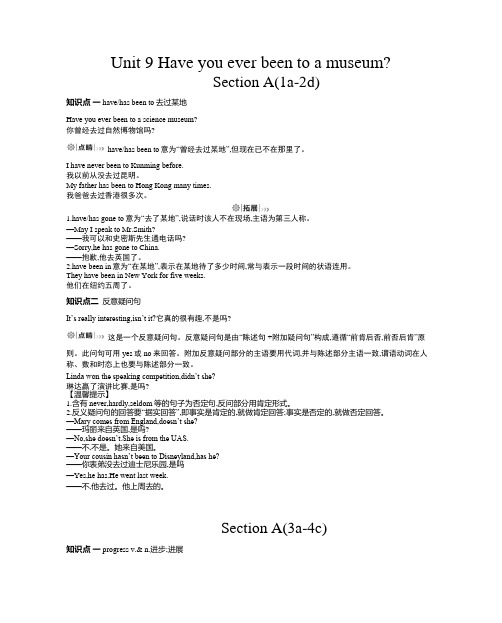
Unit 9 Have you ever been to a museum?Section A(1a-2d)知识点一have/has been to去过某地Have you ever been to a science museum?你曾经去过自然博物馆吗?have/has been to意为“曾经去过某地”,但现在已不在那里了。
I have never been to Kunming before.我以前从没去过昆明。
My father has been to Hong Kong many times.我爸爸去过香港很多次。
1.have/has gone to意为“去了某地”,说话时该人不在现场,主语为第三人称。
—May I speak to Mr.Smith?——我可以和史密斯先生通电话吗?—Sorry,he has gone to China.——抱歉,他去英国了。
2.have been in意为“在某地”,表示在某地待了多少时间,常与表示一段时间的状语连用。
They have been in New York for five weeks.他们在纽约五周了。
知识点二反意疑问句It’s really interesting,isn’t it?它真的很有趣,不是吗?这是一个反意疑问句。
反意疑问句是由“陈述句 +附加疑问句”构成,遵循“前肯后否,前否后肯”原则。
此问句可用yes或no来回答。
附加反意疑问部分的主语要用代词,并与陈述部分主语一致,谓语动词在人称、数和时态上也要与陈述部分一致。
Linda won the speaking competition,didn’t she?琳达赢了演讲比赛,是吗?【温馨提示】1.含有never,hardly,seldom等的句子为否定句,反问部分用肯定形式。
2.反义疑问句的回答要“据实回答”,即事实是肯定的,就做肯定回答;事实是否定的,就做否定回答。
—Mary comes from England,doesn’t she?——玛丽来自英国,是吗?—No,she doesn’t.She is from the UAS.——不,不是。
八年级-人教版-英语-下册-[学习任务单]Unit-9-Section-A-(1a-2d)
![八年级-人教版-英语-下册-[学习任务单]Unit-9-Section-A-(1a-2d)](https://img.taocdn.com/s3/m/7a4748550a4c2e3f5727a5e9856a561252d321ed.png)
Unit 9 Have you ever been to a museum? (Period 1)Section A (1a-2d)班级_________ 姓名_________学习目标学完这一课,你能够掌握:1.词汇:amusement、amusement park、somewhere、camera、invention;2.能力:从听力中提取关键信息,抓住时间、地点等关键词;3.交际功能:正确使用现在完成时(been、ever、never)谈论过去的经历。
课前学习任务【学习任务一】词汇检测1.n. 娱乐;游戏____________________2.游乐场____________________3.adv. 在某处;到某处____________________4.n. 照相机;摄影机;摄像机____________________5.n. 发明;发明物____________________【学习任务二】阅读教材第65至66页,根据汉语提示写出英文句子。
1.你曾去过科学博物馆吗?______________________________________________________________ 2.咱们明天去历史博物馆吧。
______________________________________________________________ 3.今天咱们去不同的地方吧。
______________________________________________________________ 4.它真的很有趣,不是吗?______________________________________________________________ 5.我还了解了一些发明,它们成就了彩色电影。
______________________________________________________________ 6.我们搭起帐篷并在外面做饭。
2020春外研版八年级英语下册课件-Module 2-M2 Unit 1 I've also entered lots of speaking competitions
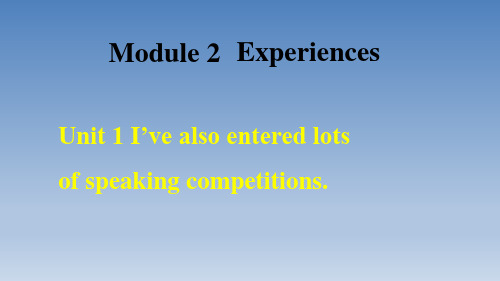
3
Listen and read. Tony: Hi, Lingling. What are you doing? Lingling: I'm entering a competition. Tony: What kind of competition? Lingling: A speaking competition. Tony: Great. It'll help you improve your speaking. And
考向三 afford 后面可以接双宾语,即afford sb.sth. “为某人提供某物”。 eg: Reading will afford you much pleasure. 阅读会给你提供很多乐趣。
知识点 4 invite/ɪn'vaɪt/v.邀请 eg: Did Jim invite you last night? 昨晚吉姆邀请你了吗?
典例 —Anna, have you (《中国达人秀》)? —Of course.I
D seen China's Got Talent it last weekend.(咸宁)
A.never; saw
B.ever; have seen
C.never; have seen D.ever; saw
【点拨】此题用语法分析法。由答语可知问句 中应用ever,由last weekend 可知是一般过去时。
2
Listen again and choose the correct answer. 1. Lingling has visited/_h_a_sn_'_t _e_v_e_r _v_is_i_te_d the US.
2020学年八年级英语下册 Unit 9 Have you ever been to a museum测试卷1(无答案)(新版)人教新目标版

Unit 9 Have you ever been to a museum?I.单项选择1. Take the map, Jeff. Then you won’t have any problem ______ that small hotel.A. findB. to findC. findingD. found2. The teacher always encourages us ______ questions in class.A. to askB. askC. askingD. asked3. —Hello! Could I speak to Lily?—Sorry, she is sleeping now. She ______ Shanghai.A. have just been toB. have already gone toC. has just been toD. has already gone to4. —Look, there’s no light in the house.A. has gone toB. has been toC. have gone toD. have been to5. He’s clever, but ______ he doesn’t work so hard.A. on one handB. on the handC. on other handD. on the other hand6. Tourists can choose to visit Kunming ______ they like-spring, summer, autumn or winter.A. whoeverB. whateverC. wheneverD. Wherever7. It’s reported that over eight ______ people lost their lives in the earthqua ke in Nepal.A. thousandB. thousandsC. thousand ofD. thousands of8. —Have you ______ watched NBA games?—Yes, I really enjoy them.A. everB. stillC. yetD. never9. —Where’s Mr. Li?—He ______ Paris. He ______ Paris many times.A. has been to ; has been toB. has gone to; has been inC. has been to; has been inD. has gone to; has been to10. —I have never enjoyed success in playing ping-pong.—Me ______ .A. neitherB. tooC. alsoD. notII.根据句意及汉语提示填入恰当的单词1. I bought a new ______________ (照相机) from the supermarket last week.2. It's ______________________ (难以置信的) that the boy can carry such a huge stone.3. I tell him to come back ______________ (无论何时) he wants to.4. Many children like to fly kites in __________ (春天).5. She ____________ (害怕) that she might not find him in his office.III.用所给单词的正确形式填空1. These __________ (Japan) came to China yesterday. They will visit the Great Wall.2. We met many ___________ (fox) in the forest.3. It's ___________(safety) to cross the road when it is a green light.4. People in Singapore ___________ (most) speak Chinese and English.5. We can buy different kinds of ___________ (India) food in the supermarket.6. Three _________ (quarter) of the earth is ocean.7. It’s a __________ (real) interesting job.8. A moment ago ________________ (thousand) of birds flew over our city.9. It’s ___________ ( believable) that he didn’t know the accident until we told him.10.The story__________(it) is moving, so I was moved.IV. 完成句子1. 这座山终年积雪。
鲁教版八年级下册英语知识点

Unit 1 Have you ever been to an amusement park?⼀..重点难点释义1. Me neither=Neither have I . 我也没去过。
(1)英语中表⽰后者与前者情形相同,“也不……”时,常⽤neither引起的倒装句Neither+助动词/系动词be/情态动词+主语。
eg:--I'm not tall. Neither is she. =She's not tall, either. 我个⼦不⾼,她个⼦也不⾼。
--They can't cook. Neither can we. =We can't cook, either. 他们不会做饭,我们也不会。
(2)如果表⽰后者与前者情形相同,“也……”常⽤so引起的倒装句, so+助动词/系动词be/情态动词+主语。
eg:--My friends are happy. So am I.=I'm happy, too./I'm also happy. --They will leave by air. So will you. =You will also leave by air. 2 hear, hear of, hear from*hear 为动词,有听见和听说之意。
作“听见”解,只强调结果。
作为:“听说”解,其后⼀般跟从句。
**hear of 听说,听到,其后跟名词或从句。
--My grandma can't hear very well. --I hear that they miss us very much. --I heard him singing in the next room. --Have you ever heard of Edison? 3. be famous for ,be famous as与be famous to**be famous for 因为……⽽出名/,for后接表⽰特点、特长的名词,表⽰⼈或物闻名的原因 --The village is famous for its green tea.**be famous as 以……⾝份出名,as后⼀般接表⽰职业的名词。
八下新目标英语Unit_9_Have_you_ever_been_to_a_museum?

【2012贵州贵阳】 “Have you ever been to Tokyo?” “Yes, I ______ there twice. It’s a modern city.”
A. have gone B. have been C. had gone
【答案】B
考查动词时态及动词的用法。问句用的是现 在完成时,答句也应该用现在完成时,前后 时态一致。have gone意为“去过,但还没回 来”;have been意为“去了,回来了”。根 据句意:你去过东京吗?我去过两次,它是 一个现代城市。故选B.
the final.
— I think so. He ________ for it for months.
A. is preparing
B. was preparing
C. had been preparing
D. has been preparing
2. By the time he realizes he _________ into a
D. Did; show
8. — Hi, Tracy, you look pale.
— I am tired. I ______ the living room all day.
A. painted
B. had painted
C. have been painting D. have painted
C. considered D. is going to consider
7. —______ you ______ him around the museum
yet?
—Yes. We had a great time there.
A. Have ; shown
人教版 八年级英语 下册 Unit_9_Have_you_ever_been_to_a_museum

dish.
Tapescripts:
Boy 1: So, Peter, how long have you been in China? Peter: I’ve been here for two weeks, but I’m going back to Australia tomorrow. Boy 1: Have you traveled much? Peter: Yes, I have. I’ve seen many interesting things. Boy 1: Have you visited the Palace Museum? Peter: Yes, I have. I went there last week. It was wonderful. There were so many beautiful treasures. Boy 1: And have you been to the Great Wall?
1st listening
1b
Listen to a student interviewing a foreign student. Check (√) the questions you hear.
___√_ Have you visited the Palace Museum?
___√_ Have you been to the Great Wall?
新人教版八年级英语下册 Uni Have you ever been to a museum全单元

精选课件
15
Amy: I’ve recently been to a very unusual museum in India, the International Museum of Toilets. I just couldn’t believe my eyes when I saw so many different kinds of toilets there. The museum
Conversation 1
1. Tina went to the space museum last year. T/F 2. John has never been to the space museum. T/F 3. They are going to take the subway. T/F
精选课件
10
2c. Look at the map in 2a and make conversations about the places.
A: Have you ever been to the space museum? B: Yes, I have. How about you? A: No, I haven’t. B: Oh, it’s fantastic. Let’s go tomorrow. A: OK. How are we going to get there? B: We can take the subway.
They have information about
different computers and who invented them. The
old computers were much bigger. It’s unbelievable
【人教英语】八下Unit 9 Have you ever been to a museum课文重难点详解 Section A
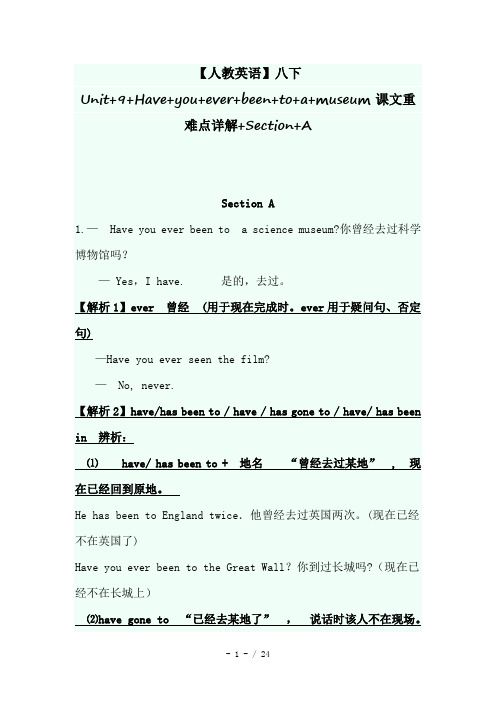
【人教英语】八下Unit+9+Have+you+ever+been+to+a+museum课文重难点详解+Section+ASection A1.—Have you ever been to a science museum?你曾经去过科学博物馆吗?— Yes,I have. 是的,去过。
【解析1】ever 曾经(用于现在完成时。
ever用于疑问句、否定句)—Have you ever seen the film?—No, never.【解析2】have/has been to / have / has gone to / have/ has been in 辨析:⑴have/ has been to + 地名“曾经去过某地”, 现在已经回到原地。
He has been to England twice.他曾经去过英国两次。
(现在已经不在英国了)Have you ever been to the Great Wall?你到过长城吗?(现在已经不在长城上)⑵have gone to“已经去某地了”,说话时该人不在现场。
He has gone to England。
他已去英国了。
(已经不在说话的地方,到达英国或者在去英国的路上)( ) Mary isn’t here. She has ____ the shop.A. been toB. went toC. gone toD. /【2013江苏中考1】A number of tourists ____ Yangzhou many times because it is such a beautiful city.A. have been toB. has been toC. has gone toD. have gone to⑶have been in +地点待在某地,常与时间段搭配。
I have been in Shanghai for three years.2. Me neither 我也没有。
八年级英语下册 Unit 9《Have you ever been to a mus
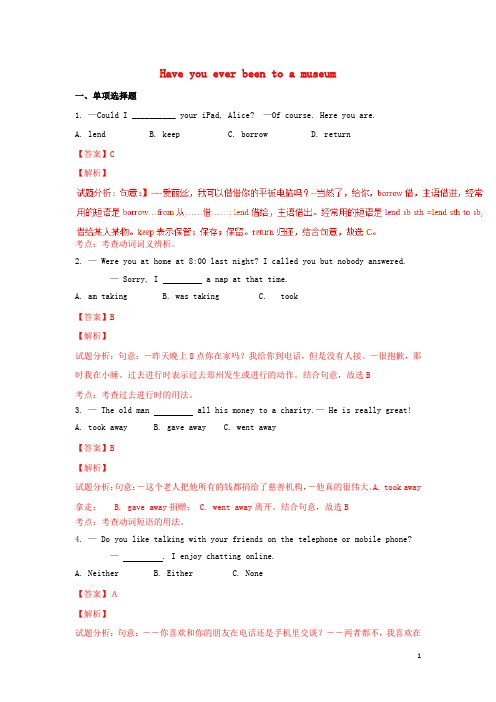
Have you ever been to a museum一、单项选择题1. —Could I __________ your iPad, Alice? —Of course. Here you are.A. lendB. keepC. borrowD. return【答案】C【解析】考点:考查动词词义辨析。
2. — Were you at home at 8:00 last night? I called you but nobody answered.— Sorry, I a nap at that time.A. am takingB. was takingC. took【答案】B【解析】试题分析:句意:―昨天晚上8点你在家吗?我给你到电话,但是没有人接。
―很抱歉,那时我在小睡。
过去进行时表示过去郑州发生或进行的动作。
结合句意,故选B考点:考查过去进行时的用法。
3. — The old man all his money to a charity.— He is really great!A. took awayB. gave awayC. went away【答案】B【解析】试题分析:句意:―这个老人把他所有的钱都捐给了慈善机构,―他真的很伟大。
A. took away 拿走; B. gave away捐赠; C. went away离开。
结合句意,故选B考点:考查动词短语的用法。
4. — Do you like talking with your friends on the telephone or mobile phone?— . I enjoy chatting online.A. NeitherB. EitherC. None【答案】A【解析】试题分析:句意:――你喜欢和你的朋友在电话还是手机里交谈?――两者都不,我喜欢在线交谈。
none 与all 用于三者以上的复数,none 为否定,all 为肯定。
鲁教版八年级英语下册1-3单元重点词汇、句型
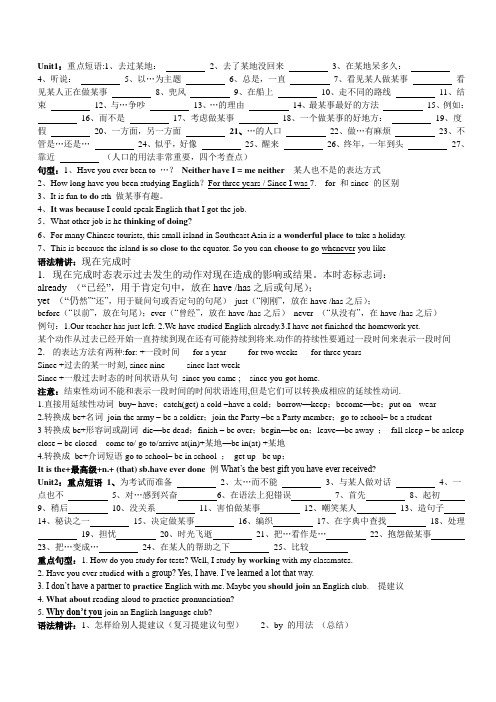
Unit1:重点短语:1、去过某地:2、去了某地没回来3、在某地呆多久:4、听说:5、以…为主题6、总是,一直7、看见某人做某事看见某人正在做某事8、兜风9、在船上10、走不同的路线11、结束12、与…争吵13、…的理由14、最某事最好的方法15、例如:16、而不是17、考虑做某事18、一个做某事的好地方:19、度假20、一方面,另一方面21、…的人口22、做…有麻烦23、不管是…还是…24、似乎,好像25、醒来26、终年,一年到头27、靠近(人口的用法非常重要,四个考查点)句型:1、Have you ever been to …?Neither have I = me neither 某人也不是的表达方式2、How long have you been studying English?For three years / Since I was 7. for 和since 的区别3、It is fun to do sth 做某事有趣。
4、It was because I could speak English that I got the job.5、What other job is he thinking of doing?6、For many Chinese tourists, this small island in Southeast Asia is a wonderful place to take a holiday.7、This is because the island is so close to the equator. So you can choose to go whenever you like语法精讲:现在完成时1.现在完成时态表示过去发生的动作对现在造成的影响或结果。
本时态标志词:already (―已经‖,用于肯定句中,放在have /has之后或句尾);yet (―仍然‖―还‖,用于疑问句或否定句的句尾)just(―刚刚‖,放在have /has之后);before(―以前‖,放在句尾);ever(―曾经‖,放在have /has之后)never (―从没有‖,在have /has之后)例句:1.Our teacher has just left. 2.We have studied English already.3.I have not finished the homework yet.某个动作从过去已经开始一直持续到现在还有可能持续到将来.动作的持续性要通过一段时间来表示一段时间2.的表达方法有两种:for: +一段时间for a year for two weeks for three yearsSince +过去的某一时刻, since nine since last weekSince +一般过去时态的时间状语从句since you came ; since you got home.注意:结束性动词不能和表示一段时间的时间状语连用,但是它们可以转换成相应的延续性动词.1.直接用延续性动词buy– have;catch(get) a cold –have a cold;borrow—keep;become—be;put on-- wear2.转换成be+名词join the army – be a soldier;join the Party –be a Party member;go to school– be a student3转换成be+形容词或副词die—be dead;finish – be over;begin—be on;leave—be away ;fall sleep – be asleep close – be closed come to/ go to/arrive at(in)+某地—be in(at) +某地4.转换成be+介词短语go to school– be in school ;get up_ be up;It is the+最高级+n.+ (that) sb.have ever done 例What’s the best gift you have ever received?Unit2:重点短语1、为考试而准备2、太…而不能3、与某人做对话4、一点也不5、对…感到兴奋6、在语法上犯错误7、首先8、起初9、稍后10、没关系11、害怕做某事12、嘲笑某人13、造句子14、秘诀之一15、决定做某事16、编织17、在字典中查找18、处理19、担忧20、时光飞逝21、把…看作是…22、抱怨做某事23、把…变成…24、在某人的帮助之下25、比较重点句型:1. How do you study for tests? Well, I study by working with my classmates.2. Have you ever studied with a group? Yes, I have. I’ve learned a lot that way.3. I don’t have a partner to practice English with me. Maybe you should join an English club. 提建议4. What about reading aloud to practice pronunciation?5. Why don’t you join an English language club?语法精讲:1、怎样给别人提建议(复习提建议句型)2、by 的用法(总结)Unit 3 重点短语:1、过去常常习惯于被用来做2、害怕(多种表达)3、对…感兴趣4、去睡觉5、四个花费用法6、不再(两种)7、几乎不8、带某人去9、支付得起10、最后11、做出一个决定12、令某人吃惊13、即使14、以…为骄傲(两种)15、注意、留心16、放弃重点句型:1、I used to be afraid of the dark。
Have you ever been to a museum_知识点汇总-人教版英语八年级下册

Unit 9 Have you ever been to a museum?一、短语归纳1.science museum科学博物馆2.history museum历史博物馆3.space museum 太空博物馆4.art museum美术馆5.water park水上公园6.amusement park游乐场7.somewhere different某个不同的地方8.have a great time玩得高兴9.take the subway乘地铁10. learn about了解11.put up搭建;支起12. color movies彩色电影13. a great way to do sth一个做某事的好方式/好方法14.in such a rapid way用如此快速的方式15.It’s unbelievable that:很难相信16.be able to do sth能够做某事17.think about 考虑18.many different kinds of许多不同种类的19. in the future在将来未来20. a couple of 少数;几个21.a perfect cup of tea一杯完美的茶22. something important重要的东西23.thousands of数以千计的24. watch sb. do sth观看某人做了某事25.want to do sth想要做某事26.encourage sb. to do sth鼓励某人做某事27.love doing sth喜欢做某事28.see sb doing sth看见某人正在做某事29.the best time to do sth做某事的最佳时间30.have problems (in) doing sth做某事有困难31. choose to do sth选择做某事32. tell sb. to do sth告诉某人做某事33.take a holiday度假34. at night 在晚上35. more than 超过;多于36.three quarters 四分之三37. on the one hand…on the other hand 一方面…另一方面38. an English-speaking country一个说英语的国家39. during the daytime 在白天40. wake up 醒来41. all year around一年到头42.close to靠近43. far from离…远44. the Great Wall长城45.the best time to do sth做某事的最好方式考点归纳考点1 辨析:have/ has been to have gone to have been in⑴have/ has been to + 地名“曾经去过某地” , 现在已经回到原地。
八年级英语下册 Unit 1 Have you ever been to an amusement
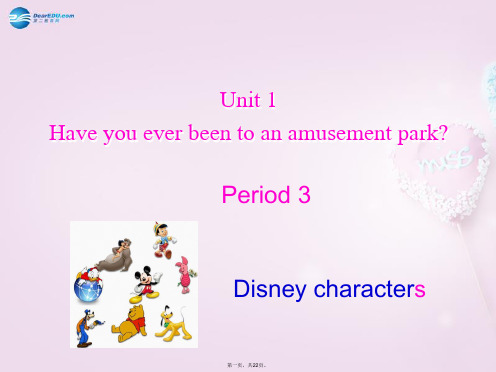
Disney Cruise
What can we do on board?
1. We cans_le_e_p__a_nd__e_a_t _o_n_b_o_a_rd_____. 2. _W__e__c_a_n_s_h_o_p_________________. 3. __W_e__c_a_n__g_o_t_o_D__is_n_e_y__p_a_r_ti_e_s__.
end up in the same place. That is Disney’s own
island. 结束于It i,s终ju止st于so much fun in Disneyland!
岛屿
你可以在船上游览(yóulǎn)几天,可以在船上睡觉、 吃饭。
第十六页,共22页。
Have you ever … a Disney Cruise? These are … that also have …. You can … for several days, and you can .... There are also …on board, just like ….
B: What’s that?
A: It’s like Disneyland, but it’s on a boat.
B: Why do you want to go on that? A: Well, you can travel to Disney’s own island.
第二十二页,共22页。
Snow White
Sleeping Beauty
The Lion King
第七页,共22页。
Nimu
Mickey House
第八页,共22页。
Donald’s Boat
2019-2020学年人教版八年级英语第二学期Unit9Haveyoueverbeentoamuseum单元测试题(含答案)
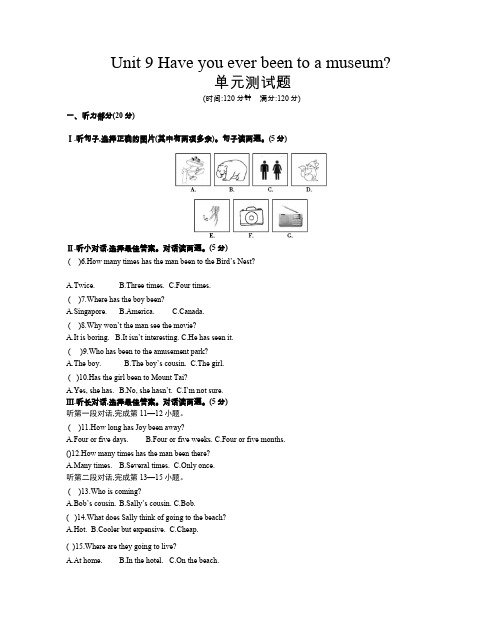
Unit 9 Have you ever been to a museum?单元测试题(时间:120分钟满分:120分)一、听力部分(20分)Ⅰ.听句子,选择正确的图片(其中有两项多余)。
句子读两遍。
(5分)Ⅱ.听小对话,选择最佳答案。
对话读两遍。
(5分)( )6.How many times has the man been to the Bird’s Nest?A.Twice.B.Three times.C.Four times.( )7.Where has the boy been?A.Singapore.B.America.C.Canada.( )8.Why won’t the man see the movie?A.It is boring.B.It isn’t interesting.C.He has seen it.( )9.Who has been to the amusement park?A.The boy.B.The boy’s cousin.C.The girl.( )10.Has the girl been to Mount Tai?A.Yes, she has.B.No, she hasn’t.C.I’m not sure.Ⅲ.听长对话,选择最佳答案。
对话读两遍。
(5分)听第一段对话,完成第11—12小题。
( )11.How long has Joy been away?A.Four or five days.B.Four or five weeks.C.Four or five months.()12.How many times has the man been there?A.Many times.B.Several times.C.Only once.听第二段对话,完成第13—15小题。
( )13.Who is coming?A.Bob’s cousin.B.Sally’s cousin.C.Bob.( )14.What does Sally think of going to the beach?A.Hot.B.Cooler but expensive.C.Cheap.( )15.Where are they going to live?A.At home.B.In the hotel.C.On the beach.Ⅳ.听短文,选择最佳答案。
- 1、下载文档前请自行甄别文档内容的完整性,平台不提供额外的编辑、内容补充、找答案等附加服务。
- 2、"仅部分预览"的文档,不可在线预览部分如存在完整性等问题,可反馈申请退款(可完整预览的文档不适用该条件!)。
- 3、如文档侵犯您的权益,请联系客服反馈,我们会尽快为您处理(人工客服工作时间:9:00-18:30)。
Unit 1 Have you ever been to an amusement park?Section B 一.教师寄语Never say die. 永不言败。
二.教学目标1.知识目标:1) New words: discover, film, wonderful, holiday, quarter, population,Brave,excellent,Indian,wake,environment,temperature,whenever,season2) Target language:I’ve been a flight attendant for two years.How lon g has he been studying at the school?2.能力目标现在完成时,一般过去时和现在进行时表将来的用法。
3.情感目标通过对未来设想的学习,培养学生积极进取、努力学习的良好品质。
三.教学重难点重点:学习运用现在完成时。
难点:学习运用词汇及表达。
四.学习过程Step1、复习引入:组织学生观看英语动画短片,复习句式:Have you ever been to ……?Say: “ In the former class, we learnt something about Disneyland. Have you ever been to Disneyland? Now, let’s see a short movie about Disney cartoons, please watch carefully and see if you can understand the English in the movie.”观看影片后寻问学生:Do you understand what the Disney characters said? I think if your English is good enough, you will understand that easily. In fact, English is very useful for us to learn, now in this class let’s t alk about why do you study English.组织学生观看投影,讨论学英语的原因。
Step2、单词学习1)Introduce the text in the following way:Now, we are going to learn a text about two persons, they talked about theirexperience about learning English. They both studied English in Hilltop language school, let’s first learn several new words of the text.通过观看投影,引导学生学习新单词。
2)听课文录音,请学生自读课文,标出新单词及课文难点。
Step3、合作探究1)为了进一步熟悉课文,掌握新单词的用法,请学生观看投影,用所学新词按原文填空。
2)用投影给出课文相关问题,要求学生两人结组,通过自读课文讨论,回答问题,并把答案写在练习本上。
Step4、点拨交流1)Have you ever been to Disneyland? 你曾经去过迪斯尼乐园吗?句型Have you ever been to SW?你曾经去过某地吗?(1) (译) 你曾经去过游乐园吗?____________________(2) _______ they ever _______ (be) to Tianjin.(3) _______ he ever _______(be) to Disneyland?2)It has the normal attractions (that you can find in a an amusement park).Have you ever said something ( th at you didn’t want to say)?Have you ever helped someone ( that you didn’t know)?以上三个句子均为that引导的定语从句,分别用来修饰前面的名词,that可以省略。
试翻译这三个句子(1) ______________________________________(2) ______________________________________(3)______________________________________3)Have you ever done sth? 你曾经做过某事吗?(done 代表过去分词)肯定回答 Yes, I have.否定No, I haven’t.-- Have you ever studied with more than three friends?-- Yes I have ./ No, I haven’t.Step5.典型例题1.-- Have you ever ____ Lin Tong to see the Terra Cotta Warriors?-- Yes ,I have.A. went toB. gone toC. been inD.been to[解析]:该句意为“你曾去过临潼的兵马俑吗”有“去过”之意的是 been to。
故选D2.He is so careless that he always ___ his school things at home.A. leaveB. leftC. leavesD. forgets[解析]:此题考察leave与forget 的区别。
把······忘记(落)在某地时用leave, 由always 判断该句为一般现在时,故用 leaves 而不用 left。
故选C3.Kate’s never seen Chinese films, _____ ?A. hasn’t sheB. has sheC. isn’t sheD. is she[解析] 此题考察反意疑问句的构成,前句用 never 否定词,后句用肯定形式,由前句中的seen 确定该句为现在完成时,故后面动词用has。
故选B4.--______ Do you write to your pen-friend? --Once a week .A. How longB. How soonC. How farD. How often[解析] 此题考察频率的提问,其特殊疑问词应用How often。
故选DStep6.中考链接1.Nice to meet you. I _____ you for a long time.A. hadn’t seenB. haven’t seenC. didn’t seeD. wi ll not seest night he had a bed to sleep__, but I had only a chair to sit ___.A. in, onB./,/C. on, inD. in, to3.About ________ of the workers in the factory were born in the ________.A.two-thirds,1970B.two-thirds,1970sC.two-third,1970D.two-third,1970s4.(2020年孝感)Is William’s lifestyle _________ David’s?A. the sameB. same asC. same toD. the same asStep7、小结回扣:Let students read and memorize the important words and sentences. Thenthe teacher can explain the difficult points if necessary.【当堂达标】一.单项选择( )1.There are two books on the desk, but____ of them is interesting。
A.none B.neither C.both D.all( )2.—Have you ever _______ to the Summer Palace, Lily?—No, I __________.A.gone, hasn’tB. gone, haven’tC. been, haven’tD. been, hasn’t ( ) 3.I have ________ the book for three days.A.borrowed B.lent C.bought D.kept( ) 4.Neither her brother nor she _________ a dictionary.A.has B.have C.get D.need( )5 Alice is an American a German. She is an Australia.A. both; andB. either; orC. neither; norD. not; but( ) 6. Mike doesn’t know French. And .A. so do IB. so am IC. neither do ID. neither am I( )7.--Which sweater do you prefer, the yellow one or the pink one?-- . I like a light blue one.A. EitherB. BothC. AnyD. Neither( )8. We have been to Water City. .A.Neither have IB. Nor have weC. So have theyD. So do they ( )9. John Beijing. He is still there.A. has been toB. has gone toC. go toD. goes to( )10. --May I speak to John?--Sorry, he Japan. But he in two days.A. has been to ;will come backB. has gone to ;will be backC. has been in ;would come backD. has gone to ; won`t come back ( )11. Neither you nor I a teacher.A. isB. areC. amD. be( )12. The Smiths China for three years.A.have comeB. have been toC. have been inD. have come to ( )13.“When his grandpa “ “ Three years ago.”A. has; diedB. is; deadC. did; dieD. is; died( )14. He took an interest English.A. atB. inC. ofD. on( )15. There is not in tod ay’s newspaper.A. nothing interestingB. interesting somethingC. interestingD. anything interesting二.用正确的动词形式填空。
